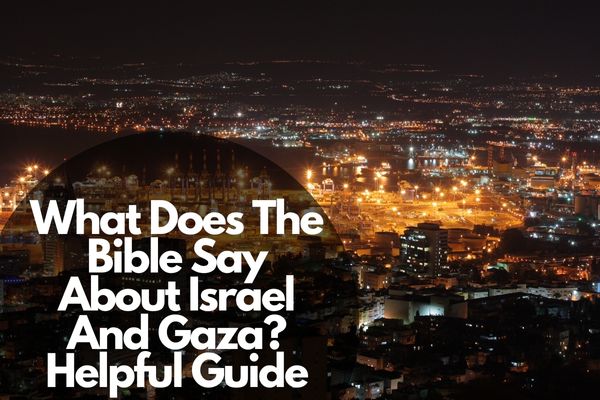The Israel-Gaza conflict has deep historical and religious roots, with the Bible playing a significant role in shaping perspectives on the region.
This article will explore the biblical connections to Israel and Gaza, offering insights into the historical context, religious significance, and the modern-day implications of these ancient narratives.
Contents
What Does The Bible Say About Israel And Gaza?
The Bible is a remarkable source of spiritual wisdom, offering guidance on a wide range of topics, including the historical and spiritual significance of Israel and Gaza. The origins of the Israel-Gaza conflict can be traced back to the creation of the state of Israel in 1948 and the displacement of Palestinians.
To understand the biblical perspective, it’s crucial to examine the concept of the Promised Land and the covenant between Abraham and God. Let’s explore this subject in detail.
The Promised Land
The concept of the Promised Land is integral to understanding the Bible’s perspective on Israel. In the Old Testament, God promised the land of Canaan (which includes present-day Israel and Gaza) to the descendants of Abraham. This promise is found in various passages, including Genesis 17:8, where God declares, “I will give to you and your descendants after you the land where you are a stranger, all the land of Canaan, as an everlasting possession.”
This promise establishes a deep-rooted connection between the people of Israel and the land of Canaan, underscoring its significance in the Bible.
The Land of Struggles
The Bible also presents a narrative of struggles and conflicts in the land of Israel and Gaza. This includes the Israelites’ exodus from Egypt, their conquest of Canaan, and subsequent interactions with the Philistines, who inhabited the region of Gaza.
These stories serve as a testament to the historical and spiritual importance of this land and the challenges faced by those who sought to inhabit it.
God’s Covenant with Israel
Central to the Bible’s teachings is the covenant between God and the people of Israel. The covenant, established through figures like Abraham and Moses, outlines the responsibilities and blessings that come with being God’s chosen people.
In relation to the land, the covenant is reaffirmed in multiple scriptures, emphasizing the divine connection between the Israelites and the territory of Canaan. As a result, Israel and Gaza hold immense spiritual significance in the context of this covenant.
The Call for Peace and Justice
While the Bible acknowledges the historical and spiritual importance of the land, it also emphasizes the values of peace and justice. Passages like Psalm 34:14 call for believers to “seek peace and pursue it,” promoting a message of reconciliation and harmony.
These teachings remind us of the importance of pursuing peace in the region, recognizing the biblical call for justice and coexistence.
Israel in the Bible
The Bible regards Israel as a chosen nation with a central role in God’s plan. Figures like Moses and King David are central to biblical narratives, and their stories are intertwined with the land of Israel.
Gaza in the Bible
Gaza, too, has a significant place in biblical history, particularly through the story of Samson. This coastal city is referenced several times in the Bible, highlighting its historical importance.
Old Testament References
The Old Testament is rich with verses mentioning the land of Israel, its significance, and the promises made to the Israelites. Passages like Genesis 12:7 and Ezekiel 36:24-28 are particularly relevant.
New Testament References
While the New Testament doesn’t focus as extensively on the land, it contains teachings that have theological implications for understanding the relationship between Christianity and the Holy Land.
Old Testament Teachings
The Old Testament also emphasizes the importance of peace. Verses like Psalm 34:14 and Isaiah 2:4 promote peace as a divine ideal.
New Testament Teachings
The New Testament builds on these ideals, with verses like Matthew 5:9, where Jesus blesses peacemakers, underscoring the Christian commitment to peace.
Biblical Perspectives on the Conflict
Interpretations of biblical passages regarding the Israel-Gaza conflict vary among different religious groups. Understanding these interpretations and identifying common themes such as peace, justice, and righteousness is crucial.
Christian Views
Christians have diverse views on the Israel-Gaza conflict, often influenced by their interpretation of the Bible. Some see the modern State of Israel as a fulfillment of biblical prophecy, while others advocate for a balanced approach to achieving peace.
Jewish Views
Jewish perspectives vary as well, with some embracing the State of Israel as a realization of biblical promises, and others advocating for coexistence with Palestinians.
Islamic Views
Islamic views on the Israel-Gaza conflict differ among sects and individuals, but many Muslims sympathize with the Palestinian cause and view Jerusalem as a sacred city.
Peace Initiatives
Numerous international organizations and individuals have attempted to broker peace in the region, including the United Nations and various diplomatic efforts.
Challenges to Peace
However, achieving lasting peace remains elusive due to deep-seated historical grievances, political complexities, and issues related to borders, refugees, and the status of Jerusalem.
Modern Political Implications
The political landscape of the Israel-Gaza conflict is heavily influenced by religion. It’s essential to explore how religious beliefs shape political decisions and how international relations play a role in this complex issue.
Challenges and Controversies
Differing interpretations of scripture have led to significant controversies within and between religious communities. These disputes have real-world consequences, affecting the lives of millions in the region. The humanitarian concerns in Gaza, especially regarding the impact on civilians, are of global significance.
Prospects for Peace
Efforts to resolve the conflict include peace negotiations and international involvement. However, faith also plays a role in peace-building through interfaith dialogues and the influence of religious leaders.
Conclusion
In this comprehensive exploration of what the Bible says about Israel and Gaza, we’ve uncovered the historical, spiritual, and moral dimensions of this complex topic. The Bible offers valuable insights into the Promised Land, the struggles of its inhabitants, and the divine covenant that binds it to the people of Israel.
As we navigate the contemporary issues in the Israel-Gaza region, we must remember the Bible’s call for peace and justice. By promoting these values and seeking understanding across faiths, we can contribute to a more harmonious future for all those who call this land home.
FAQs
1. Is Israel’s existence biblically justified?
The biblical justification for Israel’s existence is a subject of debate among different religious groups and interpretations. While some see it as a fulfillment of biblical promises, others take a more nuanced view.
2. What is the significance of Jerusalem in the Bible?
Jerusalem holds great significance in the Bible, being mentioned numerous times in both the Old and New Testaments. It is considered a holy city by multiple religions.
3. How do different religions view the Israel-Gaza conflict?
Different religious groups, such as Christians, Jews, and Muslims, have varying perspectives on the Israel-Gaza conflict, often influenced by their respective scriptures and historical experiences.








